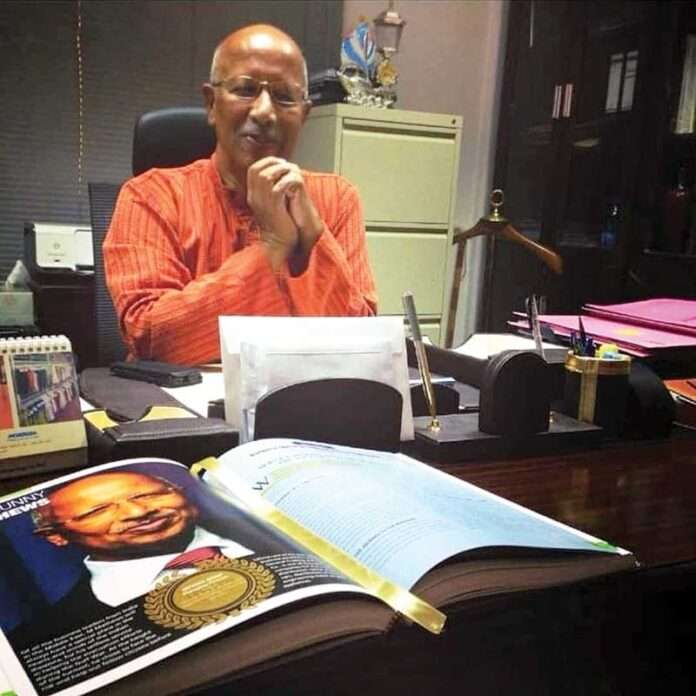At 5am on 2 August, 1990, Mathunny Mathews, a prominent businessman and Indian community leader, was shaken from his slumber by the shrill insistent peals of the doorbell and loud banging on his front door. Still bleary with sleep, Mathews answered the door and was faced with men in military uniforms asking him for water. Taken aback, he asked them who they were. The answer was a jarring shock, as he heard of the invasion of Kuwait directly, so to speak, from the horse’s mouth.
The day before, he had seen images on Kuwait TV of a grim looking Crown Prince and Prime MInister Sheikh Saad Al-Abdullah Al-Sabah returning from the futile talks he held with Iraqi leaders in Saudi Arabia. Mathews knew that the situation was serious, but he had no inkling that it would take such a nasty turn. At the time, his residence was close to the American Embassy, which was then adjacent to Dasman Palace, the official residence of the Amir, which was being bombed by the Iraqi air forces. It brought home to him the full extent of the danger and the perilousness of the situation…
Mathews, a respected and eminent member of the Indian community and a long-time resident in Kuwait, felt a strong sense of responsibility to the community. He considered it his duty to assist fellow Indian expatriates during the crisis. A few days after the invasion he moved into a friend’s home in Salmiya, and until his departure in mid October of 1990, played a leading role in the Indian Citizens Committee (ICC) that had been formed to provide succor and shelter to Indians in need of assistance.
The role of ICC in helping Indians during the invasion has been appreciated widely. Besides providing food and shelter to the hundreds of Indians impacted by the invasion, including accommodating those displaced from border camps in the homes of volunteers, the committee played a stellar role in organizing the mass evacuation of Indians. out of Kuwait.
In an interview provided to The Times Kuwait several years ago, Mathews, who sadly passed away in 2017, inpoignantly recalled those dark days and months of the invasion. People drove down to the food warehouses of leading Indian trading-house, Zahem and Malhotra, to collect food distributed by the company. The national bakeries, which remarkably still functioned, were also a vital source of ‘kuboos’, the Arabic staple bread.
However, the most emotionally taxing task that the committee had to perform was to bury the dead bodies of Indian expatriates or arrange for their bodies to be repatriated home. Pensively, Mathews noted that in those days of panic, tragedy was an inevitable consequence. He recalleds a particularly poignant story of an entire family killed in an accident on their way to safety in India.
Those were tense times. People were panicking, many insisted on leaving only by sea. This was impossible as the demand far outweighed the capacities of the vessels permitted to ship people back to India. Communications were a major problem. The ICC showed great ingenuity and courage to circumvent that particular obstacle.
A ham radio was acquired, and moved around in order to avoid detection by the Iraqi army. Through this radio, people maintained contact with the authorities in India. Mathews had his own troubles too. A group of Iraqi soldiers robbed him at gunpoint of all his personal belongings, and he also suffered financial losses to his business, but those incidents only left him all the more grateful for the most precious thing he still possessed, his life.
On 18 October, after a substantial number of Indians had been evacuated, Mathews decided to leave Kuwait. He had no second thoughts on his decision, he was one of only eight among the original 51 members of the ICC still in the country.
Once back in India, Mathews focused his energies on his business interests in Dubai. Fortunately, he was financially well off, and the losses sustained in Kuwait did not affect him as hard as it did most other people. He returned to Kuwait in June 1991, three months after the liberation. That visit was only a short stay of three days, but before long he was back to stay.
The Iraqi invasion was, for Mathews, ample proof of life’s unpredictability, and to never take it for granted. While he has no fond memories of the invasion, Mathews said he did have fond memories of the valiant stand taken by the Indian community in the face of adversity, and in particular the unity shown between all the sections of the Indian population in Kuwait.
While he regretted some of the knee-jerk decisions taken during that time, and added that if he had to do it over again, he would strive to be more organized. Mathew’s fervent hope was that the Indian community retains that sense of unity, the belief that in a foreign country regional differences mean nothing and all Indians are the same.


















